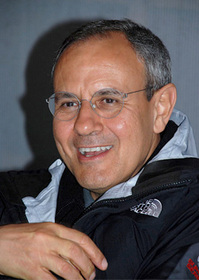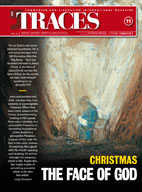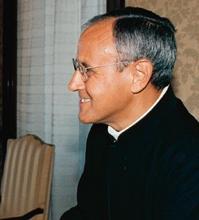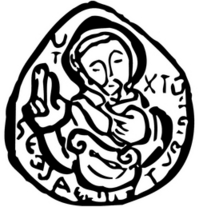This coming Monday is the fifth anniversary of the election
of Pope Benedict XVI. Communion and Liberation is encouraging people to attend
Mass, pray a Rosary, or attend Eucharistic Adoration on that day to pray for
the Holy Father, in thanksgiving for his witness to Christ.
The following
letter is from Father Julián Carrón, the President of Communion and Liberation,
sent to the Italian newspaper La Repubblica (April 4, 2010).
Let Us Return,
Wounded, to Christ
Father Julián Carrón

None of us has ever been as dismayed
as we are in front of the heart-wrenching story of child abuse. Our dismay
arises from our inability to respond to the demand for justice which springs
from the bottom of our hearts.+The request to assume responsibility, the
acknowledgement of the evil committed, the reprimand for the mistakes made in
the handling of the affair – all of this seems to us to be totally inadequate
as we face this sea of evil. Nothing seems to be enough. And so we can
understand the frustrated reactions that have been coming forth at this time.
This
has all served the purpose of making us stand face to face with our demand for
justice, acknowledging that it is limitless, bottomless – as deep as the wound
itself. Since it is infinite, it can never be satisfied. So the
dissatisfaction, impatience and even the disillusionment of the victims are
understandable, even after all the injuries and mistakes have been admitted:
nothing can satisfy their thirst for justice. It’s like entering into an
endless struggle. From this point of view, the ones who committed the abuse are
paradoxically facing a challenge similar to that of the victims: nothing can
repair the damage that has been done. This in no way means that their
responsibility can be lifted, and much less the verdict that justice may impose
upon them; it would not be enough even if they were to serve the maximum
sentence.
If this is the case, then the most burning question, which no one can
escape, is as simple as it is unavoidable: “Quid animo satis?” What can satisfy
our thirst for justice? This is where we begin to feel all our powerlessness,
so powerfully expressed in Ibsen’s Brand: “Answer me, God, in the jaws of
death: Is there no salvation for the Will of Man? No small measure of
salvation?” In other words, cannot the whole force of human will succeed in
bringing about the justice that we so long for?
This is why even those who
demand it most, those who are most insistent in calling for justice, will not
be loyal to the depth of their nature with its demand for justice if they do
not face this incapacity that they share with all men. Were we not to face it,
we would fall prey to an even crueler injustice, to a veritable assassination
of our humanity, because in order to keep on crying out for the justice that we
formulate according to our own measurement, we have to silence the voice of our
hearts, thus forgetting the victims and abandoning them in their struggle.
It
is the Pope who, paradoxically, in his disarming boldness, has not fallen prey
to reducing justice to any sort of human measure. To begin with, he admitted without
hesitation the gravity of the evil committed by priests and religious, urged
them to accept their responsibility for it, and condemned the way certain
bishops in their fear of scandal have handled the affair, expressing his deep
dismay over what had happened and taking steps to ensure that it not happen
again. But then, he expressed his full awareness that this is not enough to
respond to the demand that there be justice for the harm inflicted: “I know
that nothing can undo the wrong you have endured. Your trust has been betrayed
and your dignity has been violated.” Likewise, even if the perpetrators serve
their sentences, repent, and do penance, it will never be enough to repair the
damage they did to the victims and to themselves.
Benedict XVI’s recognition of
the true nature of our need, of our struggle, is the only way to save our full
demand for justice; it is the only way to take it seriously, to take it fully
into consideration. “The demand for justice is a need that is proper to man,
proper to a person. Without the possibility of something beyond, of an answer
that lies beyond the existential modalities that we can experience, justice is
impossible… If the hypothesis of a ‘beyond’ were eliminated, that demand would
be unnaturally suffocated” (Father Giussani).
So how did the Pope save this
demand? By calling on the only one who can save it, someone who makes the
beyond present in the here and now, namely, Christ, the Mystery made flesh.
“Jesus Christ … was Himself a victim of injustice and sin. Like you, He still
bears the wounds of His own unjust suffering. He understands the depths of your
pain and its enduring effect upon your lives and your relationships, including
your relationship with the Church.”
Calling on Christ is not a way to seek a hiding
place to run off to in the face of the demand for justice: it is the only way
to bring justice about. The Pope calls upon Christ, and steers clear of a truly
dangerous shoal, that of distancing Christ from the Church, as if the Church
were too full of filth to be able to bear Him. The Protestant temptation is
always lurking. It would have been very easy to give in to, but at too high a
price – that of losing Christ. Because, as the Pope recalls, “it is in the
communion of the Church that we encounter the person of Jesus Christ.” And so,
aware of the difficulty both the victims and the guilty have “to forgive or be
reconciled with the Church,” he dares to pray that, by drawing near to Christ
and sharing in the life of the Church, they “will come to rediscover Christ’s
infinite love for each one of you,” since He is the only one able to heal their
wounds and rebuild their lives.
This is the challenge facing all of us who are
incapable of finding an answer for our sins and for the sins of others: agreeing
to take part in Easter, which we celebrate during these days, as the only way
to see the re-blossoming of hope.
 Today the Pontifical Ethiopian College enjoyed time
Today the Pontifical Ethiopian College enjoyed time





